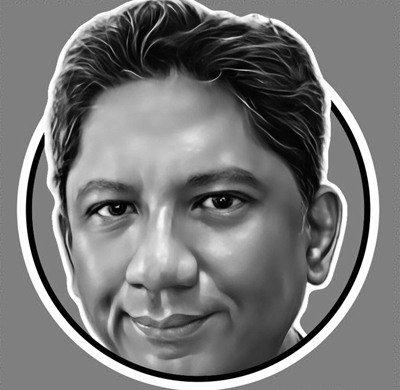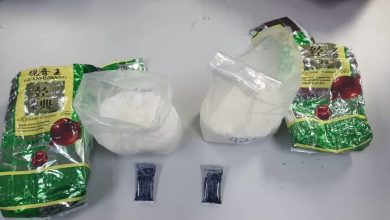Poetry Corner: CRIME REPORTER


By Julian Matthews
So you asked me, why I seemed distracted, today, even sad. As if the sadness of years gone by, the loss of friends near and dear, had descended to fill the whites of my eyes.
Then, as if to cheer me up, you asked what it was like being a crime reporter in my 20s — my first real job — and I tell you.
I remember going to the mortuary every day to fish for stories.
I remember the red blob pulled from the stuck toilet and how the firemen were called in to come unclog what turned out to be an abandoned foetus.
I remember the bodiless head beached along the Klang River, eyes shut serenely, its matted hair caked in dried mud but still wafting in the breeze.
I remember how the cop who got to it, grabbed the head, awakening it from its death sleep, then stuffed it in a black bag, like it was just another piece of garbage.
I remember the man who “fell” from the flats — right opposite the hospital. And one photographer pulled out his wallet to snap his identity card and out fell stacks of betting slips that scattered on the ground like confetti.
I remember how a woman whose neck was slashed that same day lay in ICU and how another reporter connected the two dots — the victim and the jumper were from the same address. And we raced there only to arrive at the home of the attack — where a child was still wiping both her parents’ blood off the cement porch.
I remember the gangland hit on the man by two helmeted assassins, one of whom was caught as he tried to escape, then dragged back to the house where the new widow chopped him to shreds before police arrived.
I remember the scene of the crime
The scenes of many a crime
No yellow tape, no chalk lines, no CSI, like on TV
Just blood and bodies
A hit-and-run by the roadside
A slashed victim outside of a nightclub
The pong of decomposed remains in an alley
The shallow grave in the jungle where a robber led police to his dead accomplice
Sometimes the bodies found on the street were covered in old newspapers, the warmless blanket of a crumpled newspaper, sometimes in the very newspaper I worked for
I would write the stories of their violent end that ended up in the next day’s paper
Fresh, rolled-up records, rubber-banded, flung and landing with soft thuds on a thousand front doors that morning
Like the soft thuds of a thousand casket covers shutting on the dead about to be buried that night.
I tell you how I learnt to value life as a crime reporter but contradict myself: Life is cheap. You could go anytime. We only cared for the body-count — the higher the numbers, the better for making the frontpage. If it bleeds, it leads, was our mantra.
I never cried or grieved for the dead. They were strangers to me. I did my job.
I composed stories from the decomposition of others by staying composed.
But I never forget the smell of rotting flesh.
I used the word “the body” in my stories often, as if the person wasn’t human anymore, nor had a heart nor a brain nor family nor friends.
I would use the words “no foul play” for suicides
As if those bodies didn’t play chicken with their lives — except they actually did.
I was only 20 back then. You ask what it was like seeing so much death at that young an age and I tell you I am just glad I no longer have to ask the surviving relatives the standard
questions: the victim’s age and occupation and get them to spell their name properly, or ask them whether he or she had any children.
Like the nine-month pregnant, blood-spattered woman, who just lost her husband in the highway accident, standing barefooted outside the mortuary at 2am.
All I had to offer, by way of condolence, was a grainy black and white photo, fresh from the darkroom, which the paper didn’t use, a full-length shot of the runaway truck on its side after it smashed into the driver’s side of the car she was in, along with four other cars.
“Six dead in highway crash”, the frontpage headline would read the next day. With my byline underneath it.
I remember her turning to me, still in shock, the whites of her eyes filled with the sadness of a thousand grieving, surviving wives, to say, “Thank you”, as if I needed to be thanked.
Now, I think of her sometimes. And how her life, and the life of her child turned out. But I don’t dwell on it.
I don’t even buy newspapers anymore. I don’t care to read about crime on social media either. I scroll on.
I’ve had my fix of death and human foibles for one lifetime.
I don’t want to turn into the fly on the wall, peeking into strangers’ lives.
There are enough dark clouds in my own life right now to fill my vacant eyes. Maybe it’s even a relief to actually grieve over people you care about. To be human again.
And to cry…
Published in cc&d magazine, a Scars Publication, also available in anthology Seaweed Garden on Amazon https://a.co/d/cDAdPNt
Julian is a writer and Pushcart-nominated poet published in The American Journal of Poetry, Autumn Sky Poetry Daily, Borderless Journal, Beltway Poetry Quarterly, Dream Catcher Magazine, Live Encounters Magazine, Lothlorien Poetry Journal and The New Verse News, among others. He is a mixed-race minority from Malaysia and lived in Ipoh for seven years. Currently based in Petaling Jaya, he is a media trainer and consultant for senior management of multinationals on Effective Media Relations, Social Media and Crisis Communications. He was formerly a journalist with The Star and Nikkei Business Publications Inc


